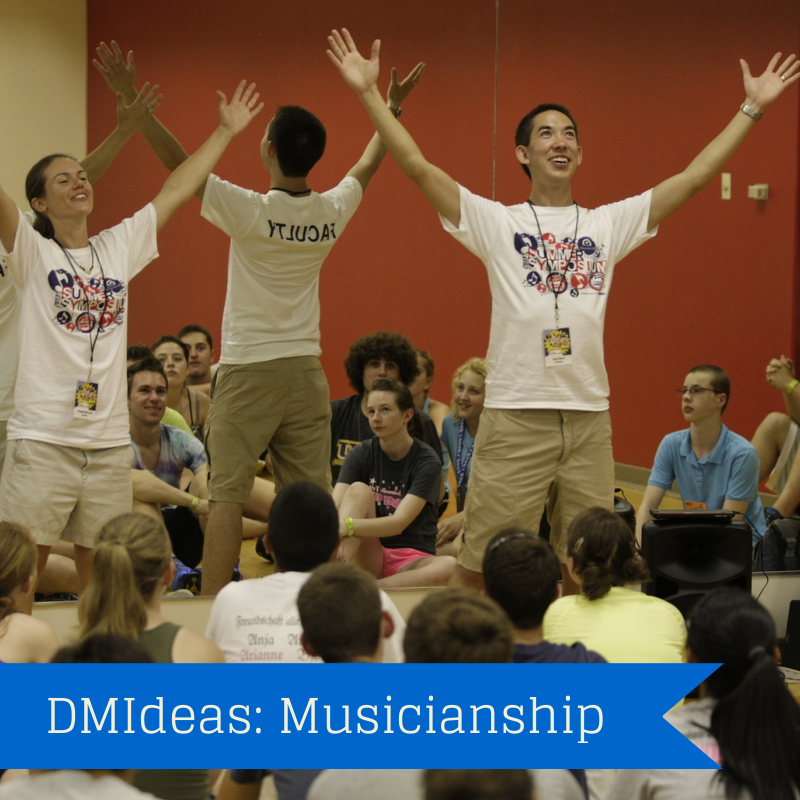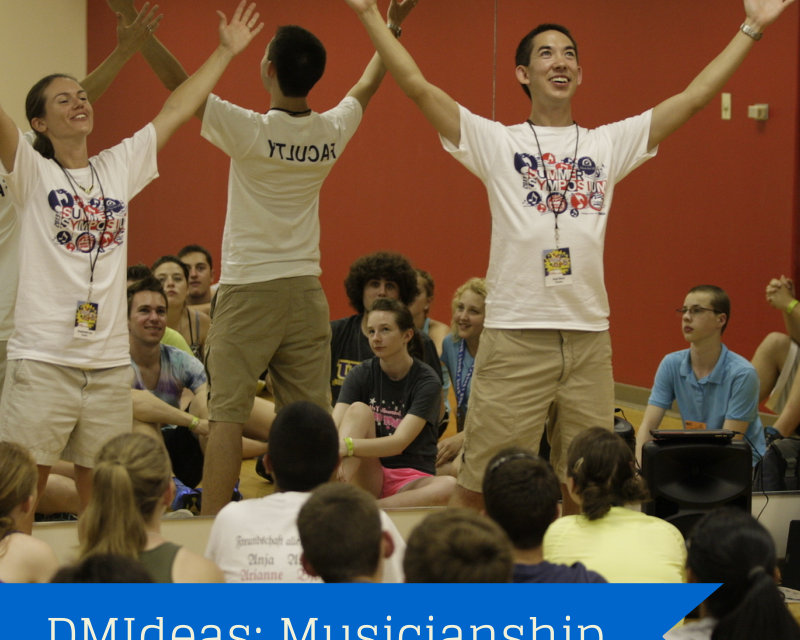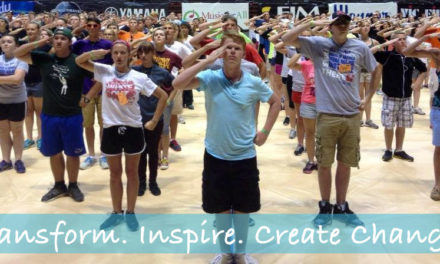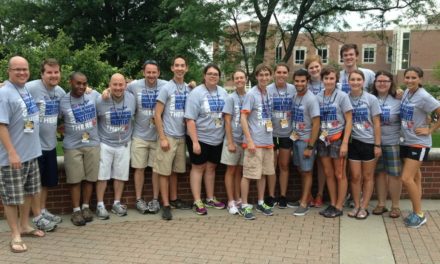Welcome to the fourth edition of DMIdeas—A blog series for student leaders from the Bands of America Drum Major Institute Staff. The BOA Drum Major Institute is committed to helping leaders dig deep into their own personality and discover the natural leadership abilities that already exist while simultaneously providing new skills for greater effectiveness. Leadership is at the CORE of every great endeavor. And at the CORE of every great leader resides honorable Character, comprehensive Content, effective Communication, and an active role in an organization’s Chemistry. Each blog will take a look at one of these facets. It is our sincere hope that we can both inform and inspire! CORE!

Content: Musicianship
“Can I really do this? I’ve never done anything like this before. I’ve never held a leadership title let alone the drum major title. What will the others think of me? What do I need to know? I don’t really know how to conduct. And I don’t really know what else is involved. Now that I think about it, what is involved? What are the responsibilities? What do I have to know?”
“How am I going to be a drum major?”
These are all thoughts that crossed my mind as I prepared for my audition to be a drum major for my high school band. Most band students at one time or another think about the possibility of becoming a drum major for their band. They often tell themselves, “Maybe I could be drum major…” But then the inevitable doubts run across their mind at some point. Questions keep coming to mind about whether they are qualified or know enough to be drum major for their band. The idea of being the top or one of the top leaders of the band is one that can be exciting and/or overwhelming. For me, I was nervous and didn’t know if I could do such a job because I had no previous experience of having a leadership title. I knew that I loved music and wanted to be able to help everyone in the band. I just wasn’t sure what I needed to know or have the skill to do to be successful.
In previous DMIdeas posts, Bobby and Stephanie did a wonderful job discussing character and challenging you to think about what kind of person you are and WHY you do what you do. We’re going to look at WHAT we need to know and have the ability to do as drum majors and WHAT you can do to prepare.
The drum major position is the ultimate servant leadership position.
Servant leadership means it’s not about you. It’s about what you can do in the background to help everyone around you achieve a common goal. This can include serving others in ways such as: picking up after the band after rehearsals and conducting skillfully in order to communicate the music to the players to perform at their best. However, in order to communicate said music to the players, we must have skill in understanding the music. We must be good musicians.
A drum major needs to be one of the best musicians in the band. This necessary skill enables the drum major to understand the music of the show and communicate that to their fellow band members through conducting on the podium and teaching off the podium. It’s imperative that the drum major is able to assist other students who need extra help with understanding how to perform the music that they must perform. The essentials of how to read music notation and expressions on the page are vital. Beyond the notes and rhythms, let’s look a little further and find out what makes a musician a good musician.
How do you know if someone is a good musician? Is it how well they play their instrument? Is it the kind of music they listen to? Or perhaps it’s about what they know about music. Yes, yes, and yes. How can you further improve your musicianship and therefore become a better musician? There are 3 ideas that can help you going on this journey of becoming a better musician…
Listen. Ask questions. Be curious.
Who are the great performers on your instrument? Do you listen to them? Do you have a favorite artist? Why do you like their music? Do you like drum corps? Do you have a favorite corps? Why are they your favorite? Do you listen to non-band music? Why do you like it? What makes it good music? Ask yourself some of these questions and stop and think about the answers.
Music is something that all of us engage in. But are we passively hearing it or are we actively listening to it? Most of the time, the music that is played around us is background sounds that exist for ambiance or mood. It’s something that we hear and have some kind of emotional response to. Aaron Copland talks about this in his book, What to Listen for in Music. He says that this kind of hearing for the “sheer pleasure of the musical sound itself” is the simplest way of listening. We hear music all the time without thinking about it or listening to it with critical intention. However, actively listening to music with intent is something of a different nature. When truly listening to music, it’s an active process that demands our full attention as we are now engaged in what is going on within the music. We can then think about questions such as: What is the melody? Who or what is performing the melody? What kind of rhythms are being performed? Who or what is performing them? What are the chords and harmonies being performed and who or what is performing them? Are there repetitive melodic or rhythmic ideas? How is it formed? Write these questions down. These are some of the questions that someone who is actively listening to music is going through in their mind as they listen. It goes beyond the surface level of passively listening to the music because it “sounds cool.” It allows you to analyze and think about WHY it sounds the way it does. This ultimately helps you understand and perhaps even helps you appreciate the music for what it is.
At one time, I disliked classical music. It was something that was old and long that just didn’t make much sense to me. It sounded boring. But when I heard the Phantom Regiment play Pachelbel’s Canon (not knowing it was classical music,) I thought it was some of the best music I had heard. It wasn’t until I was in the Phantom Regiment that I discovered a true passion for the classical repertoire. It was after a camp where we had read an arrangement of one of the Paganini Variations that I became intrigued with the idea of looking to the original. It was so pretty and I was saddened when I found out that we were not going to use the piece for the show that year. After camp I was curious as to where I could hear more Paganini, maybe even find the original (thinking that it couldn’t be as good as the arrangement we had just played) and so I searched for it on YouTube. What I discovered was incredible. I discovered Rachmaninoff for the first time and it changed my whole perception of music forever. It was the most beautiful piece I had heard and I fell in love with this music. I remember thinking: “This is classical music!? Wow…” The nostalgic melody was introduced by the solo pianist and then accompanied by the orchestra. The orchestra then took over with the melody in such a beautiful manner that it made me want to listen to it over and over again to try and understand how it could sound so beautiful. From that night of discovering Rachmaninoff (Rhapsody on a Theme by Paganini, Op.43 Variation 18 performed by Mikhail Pletnev,) I’ve not only come to appreciate classical literature but have truly taken a joy in listening and studying it. It helped me develop as a musician and it all started with a question: Where does that music come from? This got me curious to find the answer and in turn, sparked a desire and love for a genre of music that I once was simply uninterested in.
My challenge to you is to listen to different genres and styles of music from Lady Gaga to Igor Stravinsky. From Beethoven to Miles Davis. From Pachelbel to Pop Radio. You may hear similarities along with the many differences. If you like drum corps, check out what your favorite drum corps are playing and find out where the arrangements came from and listen to the original. Getting exposure to some of these different generations and genres of music can start to build a reservoir of musical knowledge. This can directly help when playing/practicing your instrument, which in turn can help give you context when we begin to dive into the printed ink we call the score. In addition, as you begin your quest to listen to music that you are unfamiliar with, you may find something new to you that you never were able to appreciate before simply because of your willingness to listen to it with great thought and care. As Aaron Copland said:
“Strive for…a more active kind of listening. Whether you listen to Mozart or Duke Ellington, you can deepen your understanding of music only by being a more conscious and aware listener—not someone who is just listening, but someone who is listening for something.” –Aaron Copland
Continue to develop your musicianship through the 3 ideas of LAB (Listen. Ask Questions. Be Curious.) From there, be diligent in your personal growth of playing your instrument. Conducting will come more easily as you learn the most important elements, which are first derived from being a good musician. I will leave you with one last idea: Time. As a drum major and conductor on the field, your first job is to keep time. How well do you keep time? You can check yourself through a simple exercise of playing the metronome and tapping your hand in time with the metronome. Turn the volume down and let the metronome keep going. Keep tapping your hand for about 8 beats and then turn the volume back up. Are you still with the metronome? If not, no problem. Do the exercise again and let the metronome go mute for 4 beats. If you were spot on after 8 beats of muted met, try going 16, 20, etc. You can do this with any tempo markings, but you will generally want to hit a few ballpark ranges such as: 80, 120, 144, and 160. Time is the first vital element in conducting as a drum major. We’ll cover the other 2 elements this summer at the BOA Drum Major Institute. Stay well this spring and good luck on drum major auditions!
CORE!
-Koji




